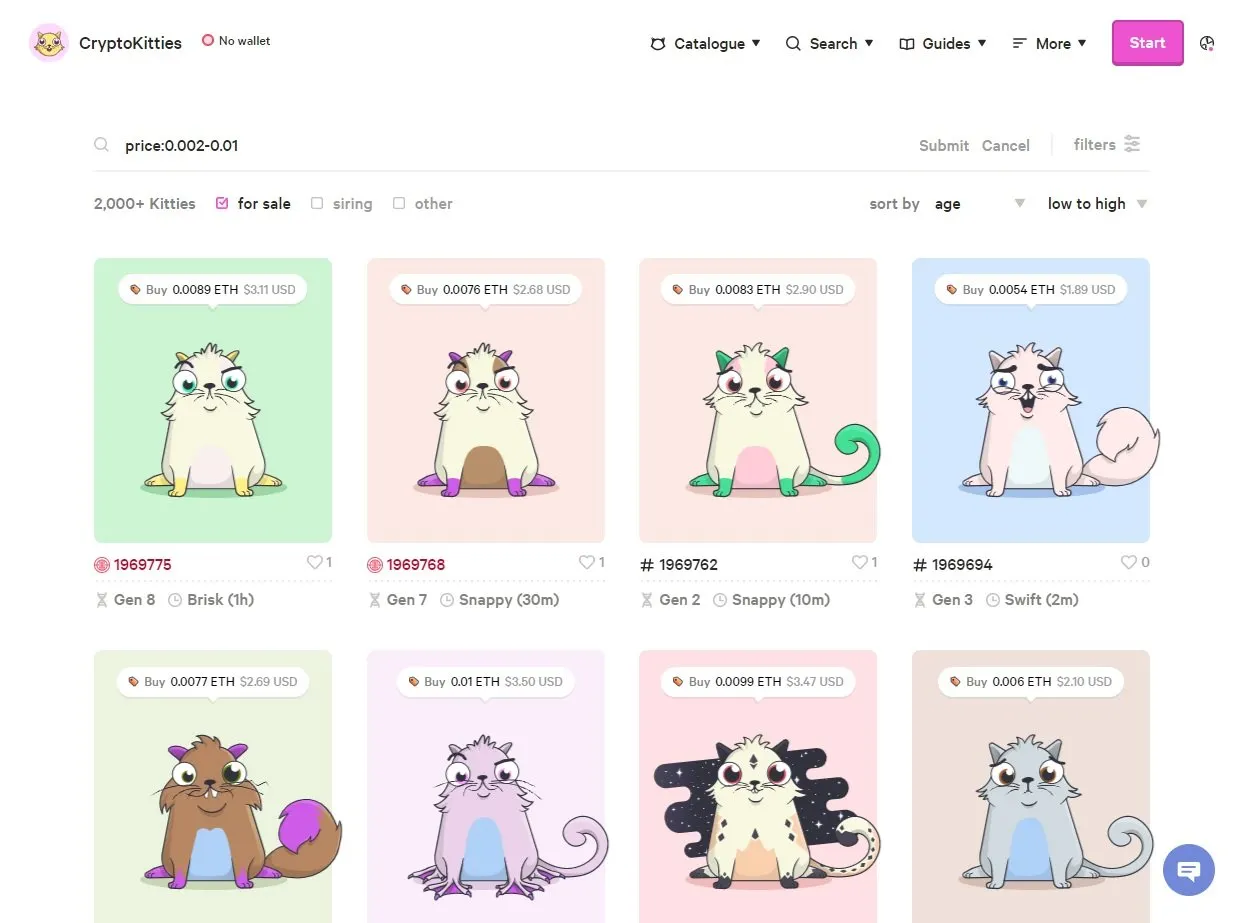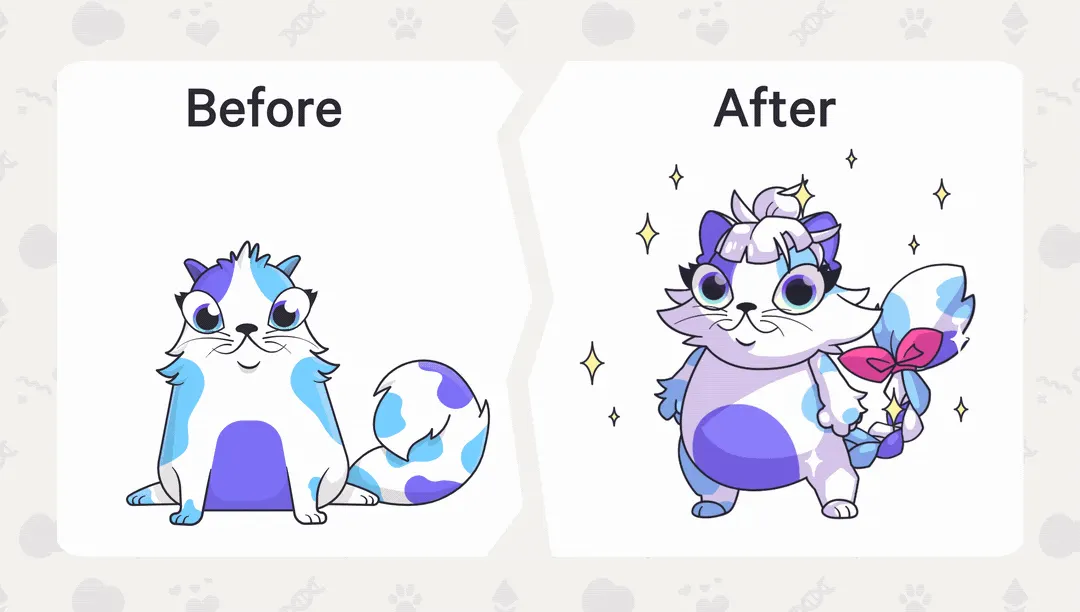Mention blockchain games, and one name is likely to come up over and over again: CryptoKitties.
CryptoKitties is an online game where players buy, trade and breed adorable digital cats. So far, so familiar; if you were born in the 90s you'll probably remember Pokémon or Tamagochi.
But CryptoKitties has one key difference up its sleeve: each CryptoKitty is completely unique, represented on the blockchain by a non-fungible token (NFT).
A pioneering example of the technology, it captured the imagination of the crypto community with a fun and tangible example of what you can create using distributed ledger technology.
How do CryptoKitties work?
CryptoKitties are non-fungible tokens, originally built on the Ethereum blockchain using the ERC721 token standard. Before the existence of ERC721, tokens on blockchains were fungible, or interchangeable; any one Bitcoin or Ethereum token is identical to any other. ERC721 allowed for the creation of unique, non-fungible tokens.
CryptoKitties was originally designed to explore the concept of digital scarcity, using smart contracts and ERC721 tokens.
Each CryptoKitty is unique and has its own digital genome, stored in a smart contract. Any two CryptoKitties can be bred; using a genetic algorithm, an offspring is produced with its own unique traits (or "cattributes"). Its visual appearance, or phenotype, is determined by the immutable genotype stored in the smart contract.
How do I buy a CryptoKitty?

To get your hands on your own CryptoKitty, you'll need a couple of things: a computer or mobile device, a cryptocurrency wallet such as MetaMask, and some Ethereum.
Then, all you need to do is head on over to the CryptoKitties marketplace, create an account, pick a cat that takes your fancy and click "buy now." Assuming you've got enough ETH in your wallet, you'll be greeted with a Dapper transaction window where you can finalize your purchase. You can also bid on a CryptoKitty if it isn't up for sale, but it's up to the owner to decide whether they want to accept or not.
Did you know?
The most expensive CryptoKitty, named Genesis, was valued at $114,481.59 at one point. That's more than the most expensive 'real' cat on record, which only cost $41,435.
How do I breed CryptoKitties?
To breed your own CryptoKitty, all you need is a breeding pair; either one can act as the Sire or Dame. The Sire will need a short recovery period after breeding, which increases each time they sire. The Dame will be unable to breed while incubating your new kitten.
To breed two Kitties you own together, click on one of them in your litter, and then click the "Breed" button that pops up; this will be the Sire. Then click on "Sire with my Kitties," and pick a cat to act as Dame; hit "OK, give them some privacy" to open up a transaction window, and soon you'll have your very own bouncing baby CryptoKitty.
Alternatively, you can breed one of your cats with a public sire, which will incur a small transaction fee.
CryptoKitties: born on Ethereum, now on Flow
CryptoKitties was originally built on top of the Ethereum blockchain. Within a week of the game launching, CryptoKitties accounted for 13% of all transactions on Ethereum. The total volume of CryptoKitties sales stands at over 61,000 ETH ($21m) as of October 2020.
CryptoKitties' popularity quickly became a problem for the Ethereum network, which could only process so many transactions at any one time. As a network gets busier, a queue starts to build. Breeding CryptoKitties became so popular, it prevented other businesses working on the platform from being able to verify their transactions quickly.
Many of these business cases were reportedly crippled by these rapidly multiplying digital cats.
A portal to a promising new open world is coming, and your Kitties will be invited to explore this new world on @flow_blockchain!https://t.co/0Z29W7urjK
— CryptoKitties (@CryptoKitties) May 22, 2020
In May 2020, CryptoKitties announced that it was moving to its own dedicated blockchain, Flow. The move will enable several new features for the game:
- 🖼️ 3D designs and animations for CryptoKitties.
- 🖧 Scalability, enabling many more people to use the network at any given time.
- 🆓 Free-to-play capability, since Flow uses the proof-of-stake consensus model.
- 🎮 The ability to use CryptoKitties within other games built on Flow.

Designer CryptoKitty collaborations
The advent of Cryptokitties has spawned a new classification of NFT-based project known as crypto collectibles. Since its inception, CryptoKitties has added cats inspired by original content from unexpected places.
They include branded designs, including a pair of CryptoKitties inspired by British rock band Muse, and designer collaborations such as one with Chinese artist Momo Wang, whose limited-edition CryptoKitties debuted on Nifty Gateway, a digital art marketplace backed by Cameron and Tyler Winklevoss.
A 2019 partnership with NFT-powered trading card game Gods Unchained let CryptoKitties players turn their cats into a Kitty-styled gaming card, although the partnership fell short of expectations; the functionality didn't stretch to allowing players to migrate their CryptoKitty to Gods Unchained, use it in that game and then send it back to CryptoKitties.
The Future of CryptoKitties
CryptoKitties is the first step in creating crypto-collectibles, a new format of digital product that can be traded online. At first, CryptoKitties struggled with scaling, but the move to a new blockchain has helped the development of this whole new industry.
CryptoKitties creators Dapper Labs have sweeping ambitions for their Flow blockchain platform, which has already raised $11 million in investment and has support from Warner Music Group and video game publisher Ubisoft. They've also inked deals with the NBA and Animoca Brands to bring the properties to their own crypto-collectibles on the Flow blockchain.
As Dapper Labs continues to build out Flow, though, the game that started it all will continue to purr contentedly at the heart of it.




